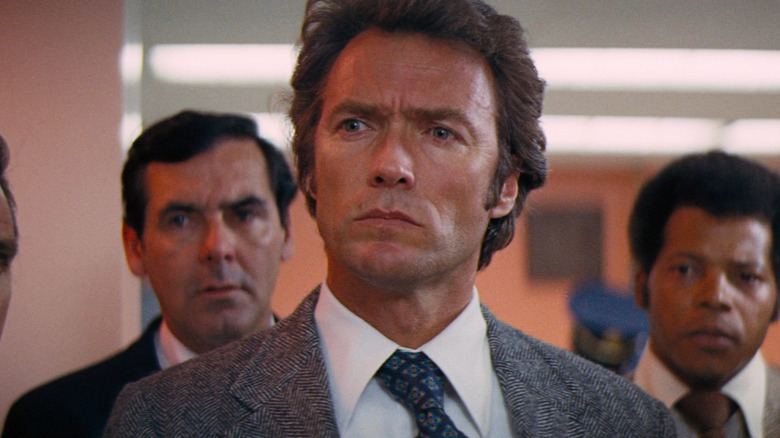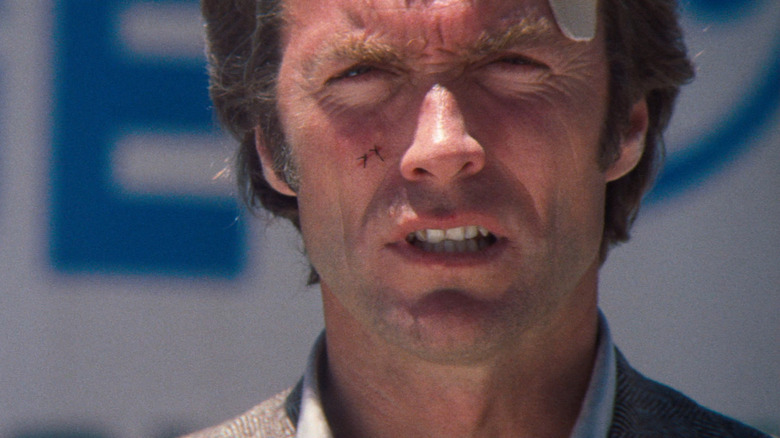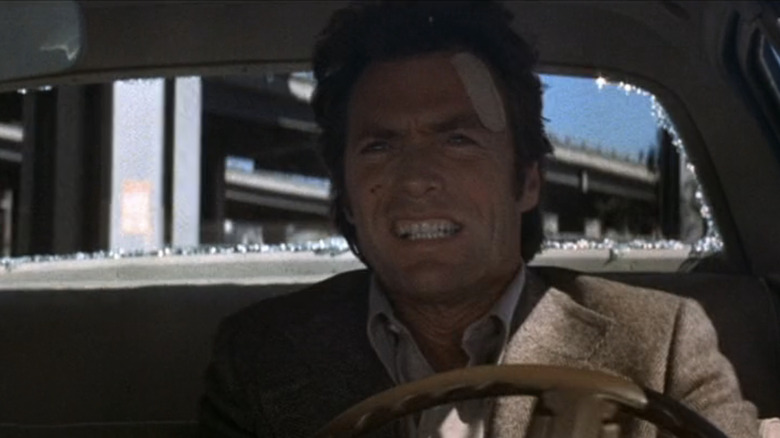How Magnum Force Director Ted Post Really Felt About Clint Eastwood's On-Set Behavior
When "Dirty Harry" arrived in 1971, it did so amid a flurry of controversy. To some, Clint Eastwood's rogue cop Harry Callahan seemed to be a celebration of police brutality, and the film overall came across as an apologia for vaguely fascist ideals. That is, unless you just took it for the brilliant action crime thriller it was. If you liked your heroes problematic, brooding, and with a healthy disdain for the rules, Callahan was one of the best main characters in the history of cinema. Those that simply enjoyed the film on that level propelled it to success, leading to a sequel and three other Dirty Harry movies. It all started in 1973 with Callahan returning in "Magnum Force," and it almost seemed as if the movie's writers were hitting out at critics of Eastwood's maverick inspector.
In "Magnum Force" the criminals are about as despicable as you can get, with Callahan hunting down a group of vigilante cops who've taken it upon themselves to violently murder criminals who slipped through the cracks of the justice system. But co-writers John Milius and Michael Cimino didn't necessarily set out to make a point about criminals being worse than rule-breaking cops. In fact, Milius found the final cut of "Magnum Force" distasteful, claiming that entire scenes had been changed from how he'd written them and turned into much more graphic or bombastic versions of the originals. For example, the infamous drain cleaner scene, in which a sex worker dies after being forced to drink the toxic liquid, was initially supposed to be referenced but not shown, and when Milius saw the final cut and its depiction of the gruesome moment in all its R-rated glory, he was shocked.
But Milius wasn't the only one who was unhappy with the final cut of "Magnum Force." For the sequel, "Dirty Harry" director Don Siegel was replaced by Ted Post, who'd previously overseen "Beneath the Planet of the Apes" and "Go Tell the Spartans," and had worked with Eastwood on 1968's "Hang 'Em High." By the end of production on "Magnum Force," however, Post was almost certain he'd never work with the veteran star again.
Ted Post and Clint Eastwood clashed throughout filming on Magnum Force
Today, Clint Eastwood is known as much for his directing prowess as his legendary on-screen presence. But even before he became an established filmmaker, it seems he always maintained an irrepressible belief in his directing talents. At least, that's the positive way of looking at it. The less favorable way of looking at it is that Eastwood thought he knew it all long before he had cemented his directorial standing. As author Patrick McGilligan put it in his book "Clint: The Life and Legend," by the time "Magnum Force" debuted it was "becoming part of Clint's mystique that even when he wasn't directing one of his films, he was the one really directing." That certainly seemed to be the case on the "Dirty Harry" sequel, with Ted Post maintaining that Eastwood thought he was the one calling the shots, many of which directly contradicted the director's desires and plans.
The book contains a rundown of the issues that arose between Post and his star, many of which seem to have cropped up once the film had already been shot. According to the director, Eastwood cut "two very important scenes" from the filming schedule, which came as a surprise to Post. Apparently, the actor wouldn't "authorize" the scenes, one of which included a long shot of Callahan on his motorbike, due to budget and timing concerns. Eastwood also sat in on the editing process, where he and Post clashed further. The director claimed his unwelcome editing partner made "side-of-the-mouth comments" designed to undermine Post's filmmaking experience, adding, "A lot of things he said were based on a pure, selfish ignorance and showed that he was the man who controlled the power."
The issue, at least in Post's estimation, was simply Eastwood's ego — which, by the time he made "Magnum Force," had, as the director put it, "began to apply for statehood." After this fraught production experience, Post believes that Eastwood made his career "an impossibility," essentially taking credit for all the best parts of "Magnum Force" and thereby implying Post was basically useless. That said, the director didn't have any concrete proof that Eastwood sabotaged his career, but as McGilligan wrote, "If it wasn't a pattern with Clint, and if the list wasn't a long one of writers, cameramen, directors and others who have struggled to prove themselves outside [Eastwood's production company] Malpaso, Post's claims could be more easily dismissed."
Magnum Force was a hit, but who was responsible?
The tension between Clint Eastwood and Ted Post on "Magnum Force" went further than some cut scenes and editing disagreements. It seems that the trouble actually started when Post asked for a second take after he noticed a mistake in an establishing shot, only for his star to push back. Eastwood is known for using the very first take on his films, and it seems that's exactly what he wanted to do in this situation. But Post stood his ground and was proven right in the end, resulting in a begrudging apology from Eastwood. According to Post, it was after this that the actor got "very tough" with him.
Regular Malpaso collaborator and cinematographer Rexford Metz appeared to back up claims of Eastwood's reluctance to fine-tune scenes. In "Clint: The Life and Legend," Metz claimed that the actor had "a lot of great ideas" but that he "won't take the time to perfect a situation. If you've got 70% of a shot worked out, that's sufficient for him, because he knows his audience will accept it." That must have been frustrating for Post, who was clearly eager to make the best film he could. In many ways he succeeded, even if Eastwood would take the credit for the success of "Magnum Force," which made more at the box office than "Dirty Harry." Eventually, Eastwood officially took on directing duties for the fourth "Dirty Harry" installment, "Sudden Impact," which remains the only sequel he ever directed and the worst film in the franchise — adding yet more evidence in favor of Post being the man behind the success of "Magnum Force."


